牛津7A Unit 4 Period 10 Checkout高品质版
- 格式:ppt
- 大小:684.50 KB
- 文档页数:21

牛津译林版七年级英语上册7AUnit4单元检测卷(有答案)七年级上学期英语练习Unit 4一、单词辩音A B C D( )1. bread eat read tea( )2. never twelve get these( )3. swim slim time practise( )4. bottle mango potato close( )5. August fun luck hungry( )6. cabbages bowls persons radios( )7. about young blouse without( )8. borrow brown window show( )9. uncle change think long( )10. salt call also always二、单项选择( )1. There is _______ "f" and _______ "t" in the word "fit"A. an, aB. a, anC. a, aD. an, an( )2. Let me ask Simon_______ me with my homeworkA. helpsB. helpingC. to helpD. to helping( )3. It’s time ____________________.A. to wake up himB. waking him upC. to wake him upD. for waking up him( )4. Don't watch _______ TV every day. It's bad_______ your eyes. .A. too many; forB. too much; forC. many too; toD. much too; to .( )5. I had _______ vegetables and there was _______ salt in it. I need water now.A. too many, too muchB. too many, too manyC. too much, too muchD. too much, too many( )6. We usually have a class meeting _______ Wednesday afternoonA. inB. /C. onD. at( )7. Do you like _________ your friends _________ the Internet?A. chat to; onB. chatting with; onC. chatting; onD. chatting; in( )8. - _______ do you have this kind of match? - Once a year.A. How longB. How farC. How oftenD. How many( )9. There ___ any bottles of juice on the table, but there ______ some packets of green tea.A. are, areB. isn’t, isC. aren’t, areD. isn’t, a re( )10. - Do you do morning exercises?- Yes, _______. I want to keep healthy.A. alwaysB. neverC. seldomD. some times( )11. - Eating more sweet snacks _______ bad for your teeth.A. doB. beC. isD. are( )12. - We will have a school trip next week. -_______.A. Have a good timeB. We willC. I'm happy to hear itD. Don't forget it( )13. - Mrs Li is very popular among the students.- Yes. Her classes are_______ lively and interesting.A. alwaysB. sometimesC. hardlyD. never( )14. New York and Washington DC are good places to visit_______May or October.A. fromB. atC. inD. on( )15. English people_______ use Mr before a man's first name (名).A. neverB. usuallyC. oftenD. sometimes( )16. —Can the boy answer the question?—No, he is ________ six years old.A. tooB. reallyC. justD. also( )17. —We do exercises twice a day at school.—That’s great. It’s good ________ you.A. atB. forC. toD. with( )18. —Jack looks sad this morning. Do you know the ________?—His dog gets ill. It makes him sad.A. subjectB. questionC. lessonD. reason( )19. —I will go on a trip to Huangshan tomorrow.—Oh, ________ you a good trip!A. hopeB. wantC. wishD. take( )20. —________ we go fishing tomorrow afternoon?—Sounds great, but I’ll ask my mot her first.A. DoB. DoesC. ShallD. Are三、完型填空Dav e is my mother’s brother. He is my 1 . He teaches music in a school. It is not big; it is 2 , but Dave likes it. He 3 at 5:30 every morning. It’s 4 , isn’t it? Then he goes out to exercise. He often 5 for half an hour. Then he takes a shower ( 淋浴) at 6:30. At about 7:20, he eats breakfast. 6 that,he goes to work at 7:40.His school is not far, so he goes to school 7 . He eats lunch at 12:00. He likes hamburgers 8 lunch. He walks home at about 5:30 in the afternoon. At about 6:30 he has dinner at home. He usually 9 with his family. He loves his children very much and often10 them stories after dinner. He goes to bed at 10:00 p.m.( )1. A. dad B. cousin C. uncle D. grandpa( )2. A. small B. busy C. new D. tidy( )3. A. takes a walk B. gets up C. eats breakfast D. plays sports ( )4. A. easy B. difficult C. early D. late( )5. A. sings B. draws C. runs D. reads( )6. A. Before B. After C. Because D. When( )7. A. by car B. by taxi C. by bus D. on foot( )8. A. at B. for C. with D. in( )9. A. thinks B. reads C. eats D. watches( )10. A. tells B. talks C. speaks D. says四、阅读理解(A)American schools begin in September after a long summer holiday. There're two terms in a school year. The first term is from September to January, and the second term is from February to June. Most American children begin to go to school when they're five years old. Most students are seventeen or eighteen years old when they finish high school.High school students take only five or six subjects each term. They usually go to the same classes every day, and they have homework for every class. After class, they do a lot of interesting things.After high school, many students go to college(大学). They usually have to pay a lot of money. So, many college students work after class to get money for their studies.( )1. In America, summer holidays begin in_______.A. JulyB. SeptemberC. MayD. February( )2. Most American children go to school at the age of _______.A. fiveB. sevenC. eighteenD. seventeen( )3. High school students_______ after class.A. do houseworkB. go to workC. play baseballD. do interesting things( )4. In order to(为了) _______, many American college students work after class.A. help their parentsB. get money for their studiesC. help othersD. learn some useful things( )5. After high school, many students go to _______.A. citiesB. workC. collegeD. towns(B)A young man goes to the city and buys himself a pair of socks. When he comes back home, he goes to his room and tries them on. He finds they are in different colours. One is blue but the otheris green. He goes into the kitchen. His mother and his sister are cooking dinner. He says to them, “The new socks are in different colours. I should make them in the same colour. Would you like to do this for me?” His mother and sister are busy and they don’t say anything. When his mother finishes cooking, she goes to her son’s room and makes the green sock in blue. She comes back without saying a word to her son. After supper, his sister goes to her brother’s room and makes one blue sock in green without saying anything to anyone.( ) 1. The young man buys the socks, and then _____________.A. he buys a ticketB. he comes back homeC. he tries them on at onceD. he puts them on at once.( ) 2. No one answers the young man because ________________.A. they don’t want to help himB. they don’t know what to do for himC. they are busy at that timeD. they are so lazy( ) 3. His mother changes the colour of one sock ______________A. before cookingB. when she finishes cookingC. after supperD. before she goes to bed( ) 4. _______________ is the last one to change the sock’s colour.A. The young manB. His motherC. His sisterD. His father( ) 5. At last the socks are _______________.A. in blueB. in greenC. in whiteD. in different colours五、用所给单词的适当形式填空。
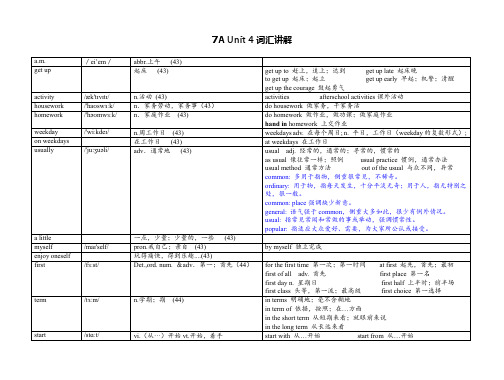
7A Unit 4词汇讲解a.m./ei’em/abbr.上午(43)get up 起床(43)get up to 赶上,追上;达到get up late 起床晚to get up 起床;起立get up early 早起;机警;清醒get up the courage 鼓起勇气activity/æk'tɪvɪtɪ/n.活动(43)activities afterschool activities课外活动housework/'haʊswɜːk/n.家务劳动,家务事(43)do housework 做家务,干家务活homework/'həʊmwɜːk/n.家庭作业(43)do homework 做作业,做功课;做家庭作业hand in homework 上交作业weekday/'wiːkdeɪ/n.周工作日(43)weekdays adv. 在每个周日; n. 平日,工作日((weekday的复数形式); on weekdays 在工作日(43)at weekdays 在工作日usually/'ju:ʒuəli/adv.通常地(43)usual adj. 经常的,通常的;寻常的,惯常的as usual 像往常一样;照例usual practice 惯例,通常办法usual method 通常方法out of the usual 与众不同,异常common: 多用于指物,侧重很常见,不稀奇。
ordinary: 用于物,指每天发生,十分平淡无奇;用于人,指无特别之处,很一般。
common: place强调缺少新意。
general: 语气强于common,侧重大多如此,很少有例外情况。
usual: 指常见常闻和常做的事或举动,强调惯常性。
popular: 指适应大众爱好、需要,为大家所公认或接受。
a little一点,少量;少量的,一些(43)myself/maɪ'self/pron.我自己;亲自(43)by myself 独立完成enjoy oneself玩得痛快,得到乐趣 (43)first/fɜːst/Det.,ord. num. &adv.第一;首先(44)for the first time 第一次;第一时间at first 起先,首先;最初first of all adv. 首先first place 第一名first day n. 星期日first half 上半时;前半场first class 头等,第一流;最高级first choice 第一选择term/tɜːm/n.学期;期(44)in terms 明确地;毫不含糊地in term of 依据,按照;在…方面in the short term 从短期来看;就眼前来说in the long term 从长远来看start /stɑːt/vi.(从···)开始vt.开始,着手start with 从…开始start from 从…开始n.开头,开端(44)at the start 开始at the start of 在…开始的时候start in 开始from the start 从一开始start up v. 开始;发动;突然站起;突然出现start at 开始于…;以…开始;因…吃惊start on v. 开始进行start for 出发,启程;动身去start out 出发;著手进行start off 出发,开始start point 出发点;起始点start doing/ to do sth 开始做某事writer/'raɪtə/n.作家(44)language/ˈlæŋɡwidʒ/n.语言(44)foreign language(s) n. 外语;外文language learning 语言学习second language 第二语言body language 身体语言natural language 自然语言spoken language 口语,口头语言;出声语言common language 共同语;公用语言native language 本国语言;本机语言;机器各单元间编码语言amazing/ə'mezɪŋ/adj.令人大为惊奇的(44)biology/baɪ'ɒlədʒɪ/n.生物学(44)biological adj. 生物学的;生物的living/'lɪvɪŋ/adj.活着的,活的(44)n. 生计;生存;生活living environment 生活环境living room 客厅,起居室living standard 生活水平,生活标准standard of living 生活水平;生活标准living space 生存空间living condition 生活条件;居住环境make a living 谋生,维持生活cost of living 生活费,生活费用for a living 为了生存;为…谋生living thing 生物living level 生活水平earn a living 谋生;活命living habit 生活习惯;生活方式alive: 其反义词为dead,指生命从奄奄一息到精力旺盛的各种状态。
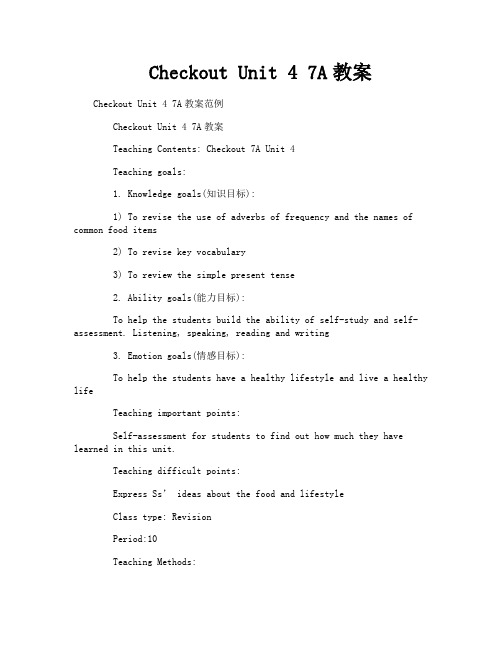
Checkout Unit 4 7A教案Checkout Unit 4 7A教案范例Checkout Unit 4 7A教案Teaching Contents: Checkout 7A Unit 4Teaching goals:1. Knowledge goals(知识目标):1) To revise the use of adverbs of frequency and the names of common food items2) To revise key vocabulary3) To review the simple present tense2. Ability goals(能力目标):To help the students build the ability of self-study and self-assessment. Listening, speaking, reading and writing3. Emotion goals(情感目标):To help the students have a healthy lifestyle and live a healthy lifeTeaching important points:Self-assessment for students to find out how much they have learned in this unit.Teaching difficult points:Express Ss’ ideas about the food and lifestyleClass type: RevisionPeriod:10Teaching Methods:1) Discussion2) Individual or group work3)Task teaching methods.Teaching aids: a computerTeaching Procedures:Step 1 Revision (17’)1)Brain storm.(4’)Ask Ss to list the names of different kinds of food according the list given on the slide.Help Ss to revise the names of food .2) Revise the countable and uncountable nouns.(2’)Ask Ss to find the countable and uncountable nouns on the slide.3) Revise the phrases“a cup of, a pack of…”etc on theslide.(2’)4) Ask and answer(4’)Work in pairs ,what’s your favourite food,why?5)Revise adverbs of frequency.(3’)Look at the chart on the slide and write some sentences. Then finish the exercises about the adverbs of frequency.6) Revise the the structure o f ‘there be’.(2’)Step 2 Presentation(3’)Amy’s mother wants Amy to have a healthy diet. How often does Amy eat these different kinds of food ? Look at her mother’s list and Amy’s diet chart on Page73 and complete the sentences belowAnswers:1.totamatoes 2.there are, 3.there is sometimes, 4.Are there any there are often, 5.here isalways usually, 6.Is there there isn’t often.Step 3 Practice(6’)Talk about your lifestyle accoring to the questions given.Step4 Guessing games(2’)Step5 Crossword Puzzle (2’)Step6 Discussion (8’)How can we keep fit?Step 7 Consolidation exercise (6’)Step 8 Summary(1’)Sum up the use of ‘there be’ structure and adverbs of frequency.After teaching: 该课件内容是牛津7A Unit4 Check out.。
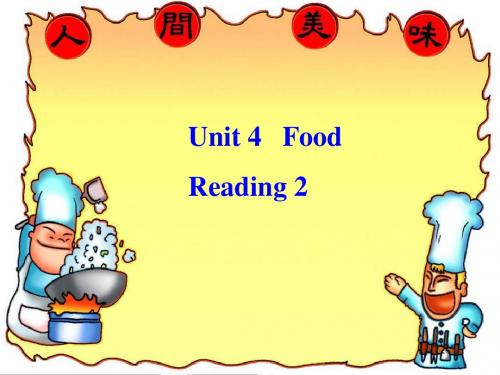
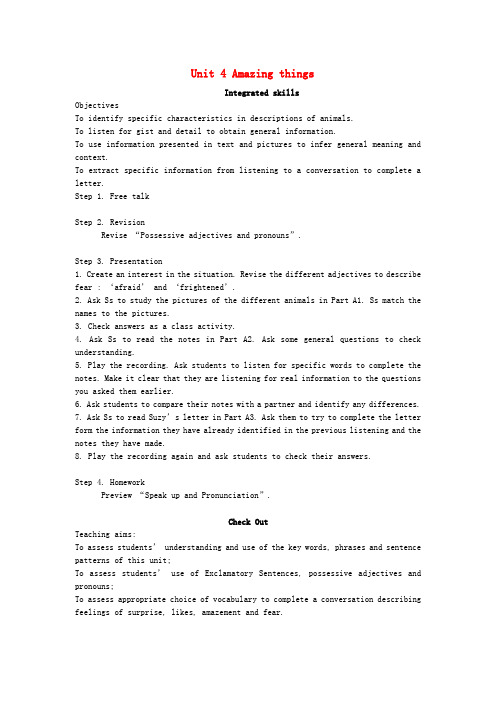
Unit 4 Amazing thingsIntegrated skillsObjectivesTo identify specific characteristics in descriptions of animals.To listen for gist and detail to obtain general information.To use information presented in text and pictures to infer general meaning and context.To extract specific information from listening to a conversation to complete a letter.Step 1. Free talkStep 2. RevisionRevise “Possessive adjectives and pronouns”.Step 3. Presentation1. Create an interest in the situation. Revise the different adjectives to describe fear : ‘afraid’ and ‘frightened’.2. Ask Ss to study the pictures of the different animals in Part A1. Ss match the names to the pictures.3. Check answers as a class activity.4. Ask Ss to read the notes in Part A2. Ask some general questions to check understanding.5. Play the recording. Ask students to listen for specific words to complete the notes. Make it clear that they are listening for real information to the questions you asked them earlier.6. Ask students to compare their notes with a partner and identify any differences.7. Ask Ss to read Suzy’s letter in Part A3. Ask them to try to complete the letter form the information they have already identified in the previous listening and the notes they have made.8. Play the recording again and ask students to check their answers.Step 4. HomeworkPreview “Speak up and Pronunciation”.Check OutTeaching aims:To assess students’ understanding and use of the key words, phrases and sentence patterns of this unit;To assess students’ use of Exclamatory Sentences, possessive adjectives and pronouns;To assess appropriate choice of vocabulary to complete a conversation describing feelings of surprise, likes, amazement and fear.Hard points:Phrases and sentence patterns;Use of possessive adjectives and pronouns;Use of Exclamatory SentencesTeaching aids:Audio-visual way. Multi-media computer, projector.Teaching procedures:1. Listen and say: A daily report.2. Warming-up activities: Look at some pictures of animals and spell the words; Play a guessing game.(This game is also about animals. Students must guess out the animal names as quickly as they can. The description will be given sentence by sentence. Guess out the answer with fewer sentences will be given more points.)3. Read and say: Fill in the blanks to consolidate some key words and phrases; Choose right words to complete a conversation describing feelings of surprise, likes, amazement and fear.4. Read, write and say: Consolidation of Exclamatory Sentences.-- Structure explanation (remind the students)—Complete sentences(to see if they can choose WHAT and HOW correctly)—Look at the pictures and make sentences in pairs(quick reaction)—Enjoy a short flash movie( for fun and relaxation)—Have a competition between girls and boys(to see how they use Exclamatory sentences freely).5. Game: finding out the owners of the objects.(Several students will show their objects to the class. The rest students have to try to remember the owners of those objects. The teacher shows the objects one by one. Volunteers answer in three kinds of sentences.)6. Quiz: to consolidate some key sentence patterns by translate some Chinese sentences into English both spoken and written.Notes after the class:。
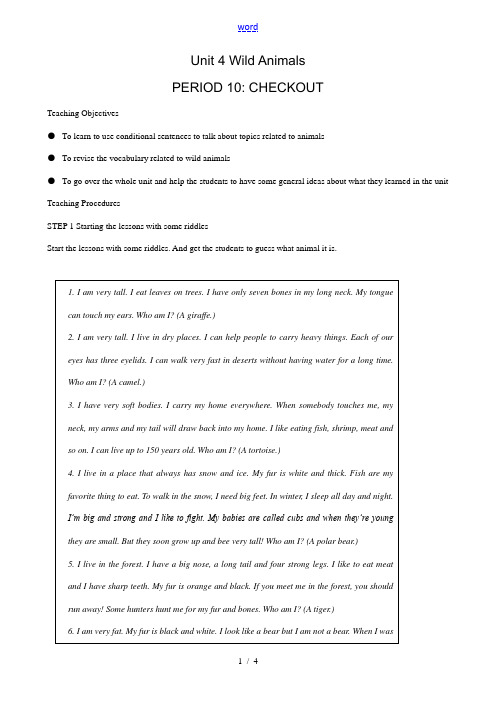
Unit 4 Wild AnimalsPERIOD 10: CHECKOUTTeaching Objectives●To learn to use conditional sentences to talk about topics related to animals●To revise the vocabulary related to wild animals●To go over the whole unit and help the students to have some general ideas about what they learned in the unit Teaching ProceduresSTEP 1 Starting the lessons with some riddlesStart the lessons with some riddles. And get the students to guess what animal it is.STEP 2 Talking about the growth of giant pandasAs the riddle elicited giant pandas, get the students to talk about the growth of giant pandas. (at birth, 10 days old, 4 months old, 6 months, 8 months, 12 months, 20 months)STEP 3 Eliciting the conditional sentencesElicit the conditional sentences by getting the students to talk about ‘What may happen to them if…?’. Show the first part of a conditional sentence and get the students to plete it.STEP 4 Giving more information about giant panda or other wild animalsSay ‘Can you tell me some more information about pandas or other wild animals?’ and get the students to give more information about giant panda or other wild animals.(Five kinds of animals are very important in the unit. You’d better talk about it usingSTEP 5Talking about other animal using conditional sentencesGet the students to talk about other animal using conditional sentences.Get the students to plete Part A & B, Page 73. Then check the answers.STEP 6 Talking about panda protectionGet the students to talk about what we have done to protect the giant pandas.Encourage the students to think about what a middle school student can do to help.STEP 7 Thinking of ways to protect endangered animalsSay ‘Not only pandas, but also many other animals are in danger. Can you tell me what they are?’ and then get them to think of ways to protect endangered animals.STEP 8 Doing some additional exercisesGet the students to do some additional exercises.STEP 9 Homeworka.Revise the whole unit and get ready for the ing test.b.Finish off the exercise in the Evaluation Handbook and Learning English.。
牛津英语沪教版7A,Unit4知识归纳课题:七年级上Unit4知识梳理与巩固教学目标:1 词汇:company ,removal ,meeting ,hurt ,broken ,carrytake notes ,knock down ,catch fire ,both …and …,run away ,fire engine2 语法:一般现在时(职业的表达及常用句型);一般过去时;see sb doing 看见某人正在做…教学重点、难点:1 . Words and vocabulary2. 一般过去时3. 辨析:see sb doing 和see sb do教学过程:一词汇梳理1. meeting ['mi:ti?] n. 会议【词性转换】 meet [mi:t] v. 遇见;会见;见到Mr White isn’t here; he’s at a meeting. 怀特先生不在这儿,他在开会2. manager ['m?nid??] n. 经理【词性转换】manage ['m?nid?] v. 管理;经营management ['m?nid?m?nt] n. 管理;管理学Our manager is very strict with us. 我们的经理对我们要求很严格。
3. take notes 记笔记Please take notes of the important words while you read.请边读边把重要的单词记下来。
4. knock down 撞倒She was knocked down by a bus. 她被公共汽车撞倒了。
5 catch fire 着火His house caught fire last night. 昨晚他家失火了。
6. both...and... ……两者都【提示】 both...and...连接的两个成分须在形式、时态、词性等方面完全一致。
《Unit 4 Amazing things》(第十课时)Checkout课时练习题It half an hour from my home to school.2 没有太阳就没有生命。
There is the sun.3 不要让门开着就离开家。
Don’t the door when you leave home.4 你知道她发生什么事了吗?Do you know ?5 人们以那个伟大的作家来命名这个图书馆。
People the museum the great writer.二、根据汉语或所给词填空.1 Edison is a famous ,He many .(发明)2 -Who is he?- Don’t you know him? He is a famous singer (name)Dao Lang.3 The little boy can keep on (play) computer without(have) a rest for three days .4 When he heard the knock, he stopped (open) the door.5 Class begins, stop (talk) please.6 When did you learn (swim)?7 They decided (not go) back home.8 He has been for two years. that’s to say, hetwo years ago.(死)9 I saw him (go) into the house.10 There is no time (wait).11 Ann felt (幸福) at her party.12 It (雪) heavily last night.13 Who (tell) you about it?14 I am too fat, I want to lose my (重).15 A famous (科学) will give us a talk next week.16 Our teacher at Lily’s party, her (appear) made us (excite)and(amaze).三、翻译句型1 多么危险的动物呀! dangerous animals!2 真漂亮! beautiful!3 这个母鸡下了个多么大的蛋呀! a big egg the hen !4我很着迷周杰伦的歌。